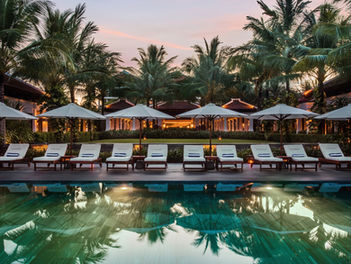New quarantine rules and vaccination roll-out for Hong Kong
- Asia Family Traveller

- Dec 11, 2020
- 3 min read

Hong Kong's Carrie Lam says the city will start its vaccination programme next month.
Hong Kong government today released details of a vaccination programme as well as publishing a list of designated quarantine hotels as part of changes to the city's quarantine-on-arrival process.
All returnees to Hong Kong are required to self-isolate in a hotel for 14 days, the only exception being for those arriving from mainland China, Taiwan or Macau. Travellers from these destinations are permitted to isolate at a residential address.
Previously, arrivals were able to select their own quarantine accommodation, as long as it was at a properly accredited hotel. However, travellers must now select from a government-issued list of properties. There are currently 30-plus hotels listed, ranging in price from the five-star Mandarin Oriental Landmark Hong Kong and the Shangri-La Group-owned Kerry Hotel to more competitively priced establishments.
Dedicated coaches will be provided to transport arrivals from the airport to their hotel, plugging a previous ‘loophole’ that meant after being discharged from the airport, travellers were able to make their own way to their hotel.
For the full list of hotels with prices per night and more detailed information such as whether properties accept outside food deliveries or minors, click online.
The government has also announced that airport testing will now take the form of a swab test conducted by medical staff. Previously arrivals were asked to provide a self-administered deep-throat saliva sample.
Travellers will also now be required to submit a third test on day 19. Those flying in from high-risk countries are asked to supply a negative test result from their country or region of departure, totalling four tests for the Hong Kong arrival process.
The government also announced today that it has secured an advance agreement for seven-and-a-half million shots of the Chinese manufactured Sinovac Biotech vaccine. Earlier this week, it was understood that Hong Kong would not be receiving any vaccinations until late 2021 at the earliest and that the population would not receive full vaccination until at least 2022.
Chief executive Carrie Lam told the media today that she now expects the majority of the city to be vaccinated during 2021. While vowing that vaccination would be free, she ruled out making it mandatory.
She said Hong Kong had managed to secure agreements with two Covid-19 vaccine manufacturers, ensuring 15 million shots in total. It's hoped the first million from Sinovac Biotech would be available from January 2021.
A further million doses by US-based Pfizer would arrive later next year, she said. This would be enough to vaccinate half a million residents as the vaccine requires two shots, three weeks apart. The Pfizer vaccine has so far been approved by three countries, including the UK, Bahrain and Canada. The UK became the first vaccination programme in the western world when the first Pfizer doses began to be administered this week.
A third deal with Oxford/AstraZeneca is hoped to secure 7.5 million more shots, although these would not be available until late 2021 at the earliest. This vaccine is yet to receive regulatory approval.
Lam refused to commit to exempting those who had received a vaccination from compulsory quarantine, although she did admit that ability to travel would be an incentive to be inoculated.
As with other countries around the world, medical staff, care home workers, the elderly and health compromised would be at the front of the queue.
Shipments of Sinovac Biotech’s CoronaVac arrived Indonesia this month in preparation for a mass vaccination campaign. However, the vaccine yet to complete its late-stage trials. According to scientific journal The Lancet, the only information currently available is from the first and second trials. These results are based on 144 participants in phase one and 600 in phase two. Late-stage trails have started in Brazil and results are expected to be published later this month.
Professor Luo Dahai of the Nanyang Technological University told the BBC earlier this month that it was difficult to make comments about the vaccine’s efficacy at this point in time “given the limited information available.”
Lam asked Hong Kong residents to be “apolitical” and “trust the scientific judgements of her team.”



















AV在线看 AV在线看;
自拍流出 自拍流出;
国产视频 国产视频;
日本无码 日本无码;
动漫肉番 动漫肉番;
吃瓜专区 吃瓜专区;
SM调教 SM调教;
ASMR ASMR;
国产探花 国产探花;
强奸乱伦 强奸乱伦;
代发外链 提权重点击找我;
游戏推广 游戏推广;
Fortune Tiger Fortune Tiger;
Fortune Tiger Slots Fortune…
谷歌马甲包/ 谷歌马甲包;
谷歌霸屏 谷歌霸屏;
מכונות ETPU מכונות ETPU;
;ماكينات اي تي بي…
آلات إي بي بي…
ETPU maşınları ETPU maşınları;
ETPUマシン ETPUマシン;
ETPU 기계 ETPU 기계;
代发外链 提权重点击找我;
google留痕 google留痕;
Fortune Tiger Fortune Tiger;
Fortune Tiger Fortune Tiger;
Fortune Tiger Slots Fortune…
站群/ 站群;
万事达U卡办理 万事达U卡办理;
VISA银联U卡办理 VISA银联U卡办理;
U卡办理 U卡办理;
万事达U卡办理 万事达U卡办理;
VISA银联U卡办理 VISA银联U卡办理;
U卡办理 U卡办理;
온라인 슬롯 온라인 슬롯;
온라인카지노 온라인카지노;
바카라사이트 바카라사이트;
EPS Machine EPS Machine;
EPS Machine EPS Machine;
EPS Machine EPS Machine;
EPS Machine EPS Machine;